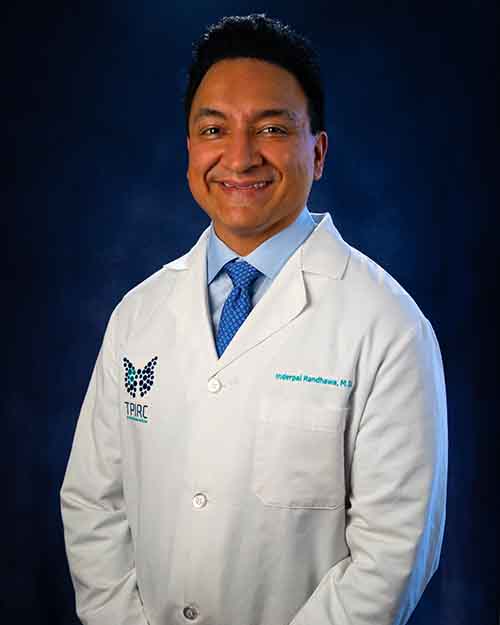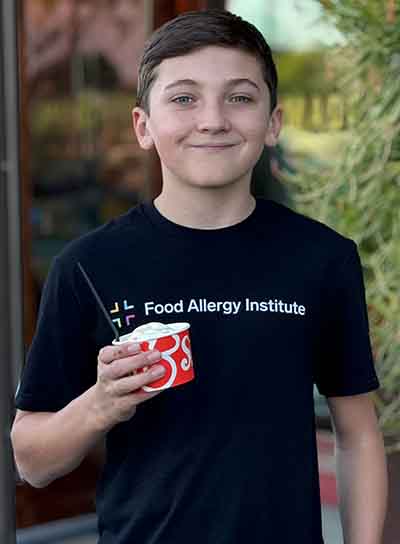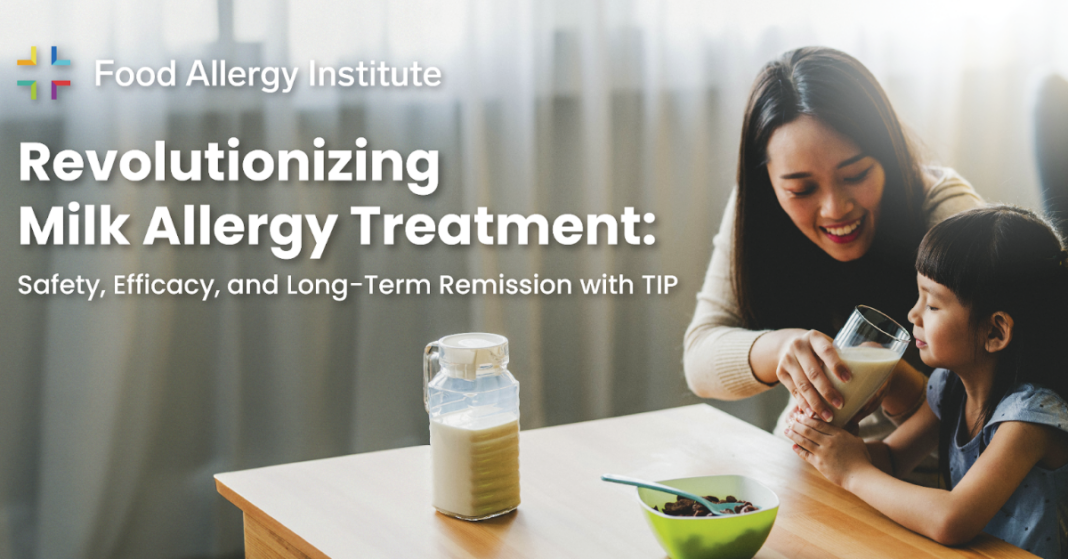Food allergies affect approximately 8% of U.S. children, equating to about 4.2 million young individuals. Historically, milk allergy have been among the most difficult to treat. For decades, children with milk allergies have faced strict dietary restrictions, constant parental vigilance, and the fear of accidental exposure. Now, the Food Allergy Institute’s Tolerance Induction Program™ (TIP) offers a new era of possibilities and a long-term solution for food allergy patients.
TIP utilizes a novel approach to food allergy treatment that allows patients to achieve clinical remission from their severe food allergies. Following a peer-reviewed study on peanut anaphylaxis last year, Food Allergy Institute (FAI) CEO and Founder, Dr. Inderpal Randhawa, has published a new article on the effectiveness and life-changing results of TIP treatment in those with cow’s milk anaphylaxis.
Read on to delve into the key findings of the study and explore how TIP is revolutionizing food allergy treatment. The program offers food allergy sufferers unprecedented freedom and a chance to live freer, fuller lives without the fear of life-threatening reactions.
A Groundbreaking Study For the Food Allergy Community
The breakthrough study, titled “Long Term Efficacy and Safety of Cow’s Milk Anaphylaxis Specific Immunotherapy: Allergen Unresponsiveness via the Tolerance Induction Program™,” highlights the efficacy of Food Allergy Institute’s proprietary food allergy treatment, the Tolerance Induction Program™ (TIP), in achieving remission in milk anaphylaxis patients. Remission is defined as “sustained unresponsiveness” of the immune system in which large, once-weekly doses of an allergen no longer elicit an allergic response.
According to the study, children once severely allergic to cow’s milk could freely and safely consume dairy products without restrictions after undergoing TIP treatment. This study is the first large-scale research proving that cow’s milk allergies can achieve remission in a large population. These new findings, published in the Journal of Allergy and Clinical Immunology, signal a paradigm shift in medical technology and the treatment of food allergies, which were long dismissed as a condition with no real long-term solution outside of avoidance.
Key Takeaways of the Study:
- Largest Study Of Its Kind: This is the largest study on biosimilar protein immunotherapy for cow’s milk anaphylaxis ever published with 214 pediatric patients enrolled. The research included a diverse group of participants, ranging in age from 2 to 21 years old, all diagnosed with severe milk allergy.
- Unprecedented Safety: Throughout the study, participants completed 56,443 food challenges* with only six incidents (0.01%) necessitating the use of epinephrine. This exceptionally low rate of adverse reactions underscores the safety of the TIP protocol. The rigorous monitoring and biosimilar immunotherapy strategy ensured minimal risk during food challenges.
- Complete Remission: All 214 participants successfully achieved remission from their milk allergies and can now consume dairy products without restrictions as a non-allergic person would. This includes common dairy items like milk, cheese, and yogurt, which were previously life-threatening. TIP is the only remission-inducing treatment option, with this level of consistent outcomes and success.
- Long-Term Success: Remarkably, every study participant has maintained a year of remission without any episodes requiring epinephrine. These findings solidify TIP’s effectiveness as a lasting solution to the fear and limitations imposed by milk allergies. All patients will continue to be monitored annually to ensure their ongoing success.
- Treatment Innovation: TIP treatment leverages machine learning models to create customized treatment plans and enhance cow’s milk immunotherapy, resulting in high-dose protein tolerance of uncooked cow’s milk.

Dr. Inderpal Randhawa, the lead researcher and corresponding author, expressed his excitement about the study’s results. “This groundbreaking study is a game changer for children suffering from milk allergies. It demonstrates that dairy allergies can achieve remission, enabling children who are anaphylactic today to eventually consume milk without restriction. As we continue to harness the power of AI in healthcare, this pioneering approach represents a significant leap forward in allergy treatment and personalized medicine, promising a future where milk allergies no longer hinder daily life. This milestone demonstrates the real-world success of AI in advancing medical treatment, providing hope and improved quality of life for millions of patients starting today.”
The Science Behind TIP Biosimilar Immunotherapy Explained
At the heart of TIP’s success is its innovative use of biosimilar immunotherapy. Unlike other treatment programs that start with small doses of the actual allergen, which can cause dangerous reactions, TIP gradually builds up the body’s tolerance for safer, more effective results.
The program begins by introducing safe, non-allergic foods similar in molecular structure to an allergen but that does not trigger an allergic reaction. Over time, these foods help “train” and “teach” the body’s immune system to tolerate the allergens before the allergens are ever actually introduced to a patient. Moreover, each patient’s dosing strategy is highly customized down to each milligram of food to address their specific immune needs.
This methodical process ensures safety and effectiveness, leading to a 99% success rate for patients who complete the program. Regardless of pre-existing conditions or the number of food allergies a patient has, TIP can help.
Food Allergy Institute has been successfully treating thousands of patients from across the globe for milk and all other food allergies through TIP treatment since 2015.
Watch as our founder, Dr. Randhawa, explains how TIP is revolutionizing the treatment of food allergies:
Understanding Milk Allergies:
Milk allergies, particularly those involving casein and whey proteins, pose a significant health concern for individuals with dairy sensitivities. Casein, a prevalent milk protein, is known to trigger allergic reactions, affecting an estimated 2-6% of children during their first year of life, with adults also susceptible.
From Research to Real-World: Stories of Freedom and Empowerment
For patients, the impact of TIP extends beyond clinical success rates. Through this life-changing treatment, children and young adults can now enjoy ice cream, cheese, and other dairy delights without fear for the first time in their lives. This freedom extends to social situations, travel, and everyday choices, breaking the shackles of food allergies and opening up a world of possibilities. Finally, food allergy families can breathe easy and enjoy the peace of mind that a solution to food allergies exists.
Read Tayler’s mom’s testimonial on how he conquered his milk allergy.

“The appointment where we cleared dairy was a huge day for us! Being able to go to the store and know that we don’t have to avoid dairy is so freeing. Tayler has enjoyed eating different foods and string cheese is his favorite so far!”
Conclusion:
This groundbreaking study by Food Allergy Institute Founder Dr. Inderpal Randhawa represents a monumental advance in milk allergy treatment. As the largest study of its kind, it demonstrates that dairy allergies can achieve remission, transforming the lives of anaphylactic children. Utilizing Artificial Intelligence and extensive data, the Tolerance Induction Program (TIP) enables effective, patient-specific treatment while maximizing patient safety. This is a game-changer for children with milk allergies, allowing them to consume unrestricted amounts of dairy products without fear. TIP is not just a medical breakthrough. It is the promise of freedom and normalcy for millions of food allergy families worldwide.
Have questions or ready to get started? Schedule your free virtual consultation now!
*An oral food challenge (OFC), or feeding test, is a medical procedure in which a food is eaten slowly, in gradually increasing amounts, under medical supervision, to accurately diagnose or rule out a true food allergy.





